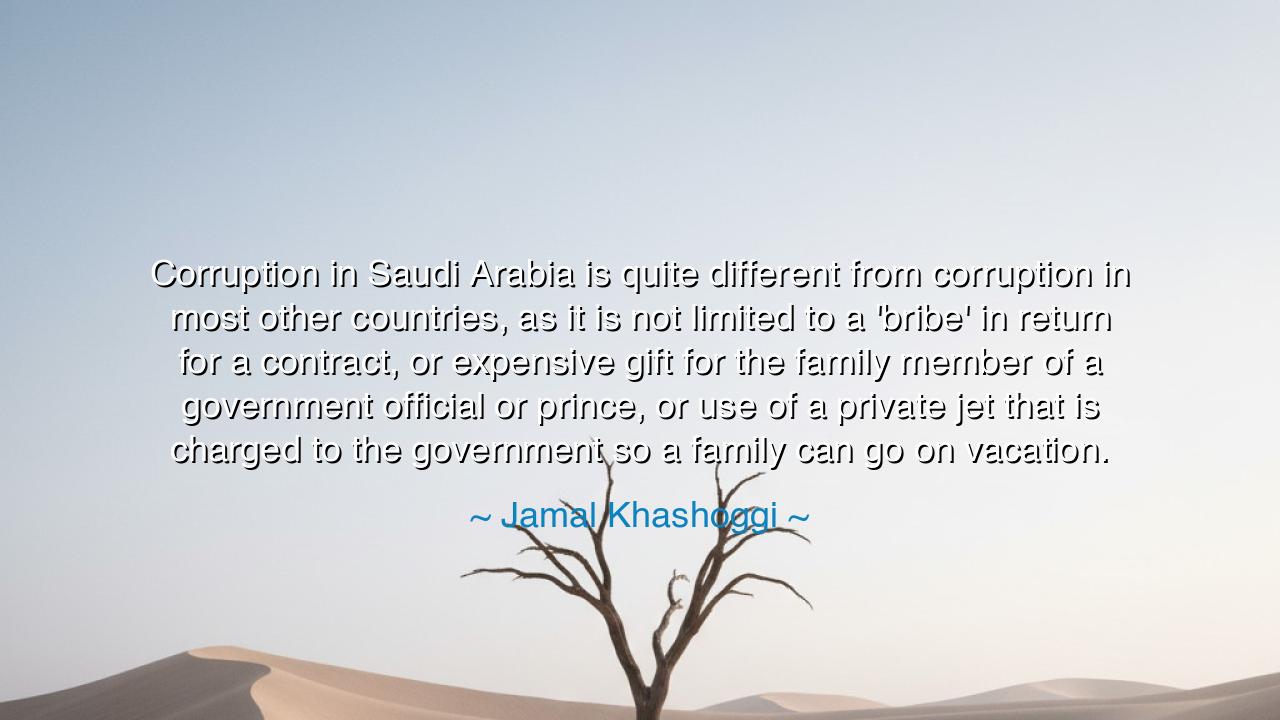
Corruption in Saudi Arabia is quite different from corruption in
Corruption in Saudi Arabia is quite different from corruption in most other countries, as it is not limited to a 'bribe' in return for a contract, or expensive gift for the family member of a government official or prince, or use of a private jet that is charged to the government so a family can go on vacation.






Host: The room was filled with a quiet stillness, the light from the window casting long, soft shadows across the floor. The world outside was dimming, the evening settling in, but inside, there was a feeling of anticipation. Jeeny sat at the table, her fingers lightly tapping on a notebook, her thoughts clearly elsewhere. Jack, standing by the window, stared out at the darkening sky, absorbed in thought. The quiet between them felt heavy, like a conversation was waiting to unfold.
Jeeny: (breaking the silence, her voice steady) “I came across something today by Jamal Khashoggi that made me think. He said, ‘Corruption in Saudi Arabia is quite different from corruption in most other countries, as it is not limited to a ‘bribe’ in return for a contract, or expensive gift for the family member of a government official or prince, or use of a private jet that is charged to the government so a family can go on vacation.’ What do you think about that?”
Jack: (pauses, his voice thoughtful) “It’s an interesting perspective, isn’t it? Khashoggi is saying that corruption in Saudi Arabia goes beyond the traditional view of bribery or gifts for favors. It’s more embedded in the structure of the system, almost normalized in a way. It’s not just about transactions between individuals; it’s about an entire system where resources are diverted for personal gain, even at the government’s expense.”
Jeeny: (nodding slowly, her voice calm) “Exactly. He’s pointing out that the corruption is so deeply ingrained in the system that it doesn’t appear as isolated incidents of bribery. It’s systemic—it’s the way the system is set up. The wealth and power of the elite are maintained through these actions, which may seem insignificant on the surface, but in reality, they’re part of a much larger, deeply entrenched practice.”
Host: The stillness in the room grew, the weight of Jeeny’s words lingering between them. Jack shifted slightly, his posture softening as he absorbed the deeper meaning of the quote. The world outside had quieted, and inside, the conversation seemed to have shifted into something more profound—something about the complexity of corruption and how it works within power structures.
Jack: (his voice quieter now, more reflective) “It’s almost like the actions themselves aren’t seen as wrong by those in power because it’s expected. It’s not just the ‘bribe’ for a contract—it’s everything that supports the system, the hidden costs that are never questioned. Like the use of government resources for personal vacations. That’s not just corruption in the traditional sense; it’s a way of life, a structure that perpetuates itself.”
Jeeny: (softly) “Exactly. It’s not just about individuals taking advantage of power for their own gain—it’s about the system that allows for and even encourages this behavior. It’s part of the fabric of governance, woven into the way the state operates. That’s why it’s so hard to define or address—it’s not just corruption; it’s the norm.”
Jack: (pauses, voice thoughtful) “And that’s why it’s so difficult to challenge. When corruption is the system, when it’s ingrained in how things are done, it becomes hard to separate the two—government and corruption. They are no longer seen as separate entities. It’s a normalized part of the machinery that runs the country.”
Jeeny: (gently) “Yes, and the hardest part is that this form of corruption isn’t just about unethical behavior—it’s about the lack of accountability. When a system becomes so entrenched in its corruption, it doesn’t just perpetuate inequality, it ensures that the wealthy and powerful stay in control. It makes it almost impossible for change to happen because accountability is built into the system as something that’s not supposed to happen.”
Host: The quiet between them deepened, the weight of their words hanging in the air like a shared truth. The world outside had fully settled into night, but inside, the realization that corruption can become a system in and of itself—something ingrained and normalized, rather than an isolated event—had taken root. Jeeny and Jack sat in the understanding that the fight against corruption in such systems is not just about individual acts—it’s about changing the very structure that enables it to persist.
Jack: (with a soft sigh, his voice more reflective) “I guess the hardest part is realizing that corruption in a system like that doesn’t always feel like corruption. It’s not always the obvious bribe or the extravagant gift—it’s in the everyday decisions, the normalization of practices that shouldn’t be allowed, but are so deeply ingrained.”
Jeeny: (smiling softly) “Exactly. And that’s why it’s such a difficult thing to confront. It’s not just about one-off instances—it’s about changing a culture, a mindset that has been in place for so long.”
Host: The room seemed to hold its breath, the conversation leaving behind a quiet sense of realization. Jeeny and Jack had uncovered something much deeper than a simple critique of corruption—it was about how deeply corruption can become rooted in a system, how it becomes part of the framework, so ingrained that it becomes difficult to even recognize it. The world outside had grown still, but inside, the understanding that corruption, when normalized, becomes a systemic issue, deeply embedded in how a country functions, had taken hold.






AAdministratorAdministrator
Welcome, honored guests. Please leave a comment, we will respond soon